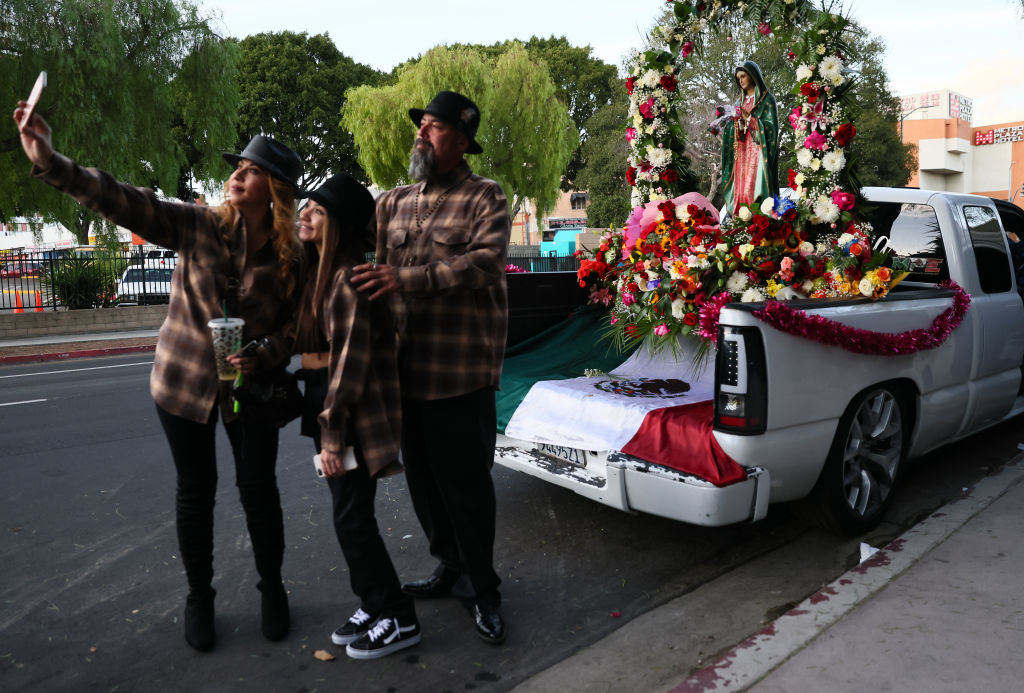![Kamora Shambley lite the first of seven candles during a celebration of the first day of Kwanzaa at the Martin Luther King Recreation Center Wednesday December 26, 2018 in St. Paul, MN.] Jerry Holt • Jerry.holt@startribune.com Kamora Shambley lite the first of seven candles during a celebration of the first day of Kwanzaa at the Martin Luther King Recreation Center Wednesday December 26, 2018 in St. Paul, MN.] Jerry Holt • Jerry.holt@startribune.com](https://api.time.com/wp-content/uploads/2022/12/kwanzaa-holiday.jpg?quality=85&w=2400)
While December may be synonymous with the arrival of Christmas for many, it includes other major cultural and religious holidays around the world as well, such as celebrating Buddha’s enlightenment; commemorating an apparition of the Virgin Mary; and honoring African-American heritage.
Here are several important celebrations that occur during December’s holiday season:
St. Nicholas Day (Dec. 5 or 6)
Also known as the Feast of Saint Nicholas, Christians honor the birthday of Saint Nicholas—the inspiration behind Santa Claus, given his proclivity towards gift-giving.
Immaculate Conception Day (Dec. 8)
Catholics celebrate the day of Immaculate Conception to honor the Virgin Mary, who is believed to have been born without original sin. The day is often celebrated by going to church and feasting.
Bodhi Day (Dec. 8)
Also known as Rohatsu, this Buddhist tradition honors the day in which the Buddha—Siddartha Gautauma—is said to have achieved enlightenment. Many Buddhists celebrate it through meditation.
Feast Day of Our Lady Guadalupe (Dec. 12)
Mexicans and Mexican-Americans often celebrate the feast day of Our Lady of Guadalupe, the patron saint of Mexico who symbolizes patriotism and devotion.
Millions of pilgrims typically visit the Basilica of Our Lady of Guadalupe in December to celebrate the festival, which marks one of several apparitions of the Virgin Mary that some Catholic believers say was witnessed by an Indigenous Mexican man in 1531.
The Virgin Mary’s face is abundant in Mexico—in homes, shops and shrines.

Hanukkah (Dec. 18-26)
The eight-day Jewish holiday of Hanukkah begins Dec. 18. A central part of the Jewish Festival of Lights entails the lighting of a nine-branched menorah each night. (The ninth candle is used to light the others.) The ritual symbolizes how one day’s worth of oil miraculously lasted for eight days during a battle between a small group of Jewish people and the powerful Greek-Syrian army in 165 B.C. Per Jewish tradition, they are said to have emerged victorious and reclaimed the Holy Temple in Jerusalem.
Customary foods include latkes (potato pancakes), sufganiyot (jam-filled donuts) and brisket. Children often play with a dreidel (a spinning top with Hebrew letters).
More from TIME
Yule (Dec. 21-Jan.1)
Wiccans and Neo-Pagans celebrate the winter solstice (the darkest day of the year, on Dec. 21) through the festival of Yule. The winter solstice marks the shortest day and longest night of the year; Yule celebrates the re-emergence of the sun and the days beginning to grow longer again. The festival was first celebrated in Scandinavia as a Norse festival.
A common tradition is burning the yule log, which originally was done to celebrate the sun’s return. It has since also been folded into a Christmas tradition. In fact, Yule became associated with Christmas in the 9th century, although some still stick to the original Yule celebrations.
Christmas (Dec. 25)
Christians celebrate Christmas largely to commemorate the birth of Jesus. But the festival has also been adopted as a secular family holiday by people of all faiths. It’s marked by an exchange of gifts as well as excitement for the arrival of Santa Claus.
Boxing Day (Dec. 26)
A British tradition that occurs the day after Christmas and dates back to the 1800s when Queen Victoria ruled the throne. At the time, it was a day to ensure that upper class Britons gave servants and workers a day off, in addition to giving them a present. The holiday has since evolve into a more commercial occasion for gift-giving.
Kwanzaa (Dec. 26-Jan. 1)
The week-long holiday of Kwanzaa honors African-American heritage; it’s a cultural holiday as opposed to a religious one.
Black nationalist Maulana Karenga created Kwanzaa in 1966 as a way to unite the African-American community following the Watts Rebellion in a predominantly Black Los Angeles neighborhood. An uprising against systemic racism began after a white California highway patrol officer arrested a young Black man for drunken driving. The rebellion led to 34 deaths—two-thirds of which were individuals shot by police or National Guard troops, per the Associated Press. It also resulted in more than 1,000 injuries.
Karenga laid out seven key principles for Kwanzaa: unity; self-determination; collective responsibility; cooperative economics; purpose; creativity; and faith. Its name comes from the Swahili phrase “matunda ya kwanza,” which translates to “first fruits.” Kwanzaa celebrations draw from African musical and storytelling traditions.
Zarathosht Diso (Dec. 26)
Founded by the Prophet Zoroaster more than 3,000 years ago, Zoroastrianism is one of the world’s oldest monotheistic religions. Zoroastrians honor the death of their prophet on this day, typically by visiting a fire temple and offering prayers.
New Year’s Eve (Dec. 31)
The day every new year is met with anticipation around the world, as revelers party, set off fireworks, set resolutions and count down to midnight to welcome in new beginnings. In many post-Soviet countries, the holiday is celebrated with traditions similar to Christmas, such as the arrival of gifts from “Grandfather Frost.”
More Must-Reads from TIME
- Cybersecurity Experts Are Sounding the Alarm on DOGE
- Meet the 2025 Women of the Year
- The Harsh Truth About Disability Inclusion
- Why Do More Young Adults Have Cancer?
- Colman Domingo Leads With Radical Love
- How to Get Better at Doing Things Alone
- Michelle Zauner Stares Down the Darkness
Write to Sanya Mansoor at sanya.mansoor@time.com